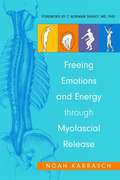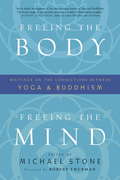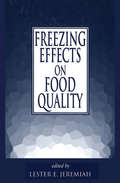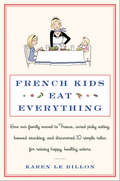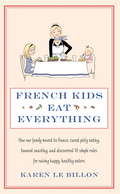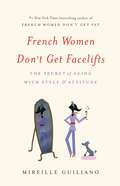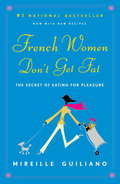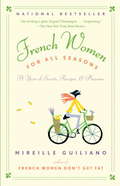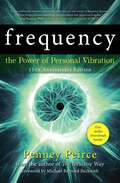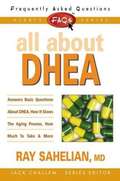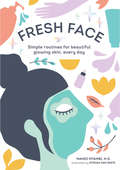- Table View
- List View
Freeing Emotions and Energy Through Myofascial Release
by C. Norman Shealy Noah Karrasch Julie Zaslow Amy RizzaToo many of us hold our physical, mental and emotional pain within our bodies, where it slows energy, manifests as tension and can have a damaging impact upon our health. In his new book, Noah Karrasch shows that wellbeing and healing come from the detangling of blocked emotions and the restoration of the free flow of energy through the body. Written for bodywork and manual therapy practitioners from a wide variety of disciplines, as well as other healers who want to expand their skills, this generously illustrated book explains how and where emotions and static energy are held in the body, and how they can be released and rebalanced in therapies that challenge bodymindcore awareness. It includes many new ideas and techniques: useful conversation starters to help practitioners encourage clients to self-identify their challenges, detailed explanations of myofascial release techniques and self-reflective exercises designed to first help the practitioner truly understand the process for him or herself, through his or her own body, in order to become a more empathetic and effective therapist. This important book will enable bodywork and manual therapy practitioners to work more confidently, and more intuitively, with their clients.
Freeing the Body, Freeing the Mind: Writings on the Connections between Yoga and Buddhism
by Michael Stone Robert A. ThurmanIn this collection of provocative essays by prominent teachers of Yoga and Buddhism, the common ground of these two ancient traditions becomes clear. Michael Stone has brought together a group of intriguing voices to show how Buddhism and Yoga share the same roots, the same values, and the same spiritual goals. The themes addressed here are rich and varied, yet the essays all weave together the common threads between the traditions that offer guidance toward spiritual freedom and genuine realization. Contributors include Ajahn Amaro Bhikkhu, Shosan Victoria Austin, Frank Jude Boccio, Christopher Key Chapple, Ari Goldfield and Rose Taylor, Chip Hartranft, Roshi Pat Enkyo O'Hara, Sarah Powers, Eido Shimano Roshi, Jill Satterfield, Mu Soeng, Michael Stone, Robert Thurman.
Freelance Writing On Health, Food and Gardens
by Susie KearleyIn 2011 Susie Kearley quit a 15-year marketing career to start up as a freelance writer in the middle of a recession. In this book, she shares how, in under two years, she went from being an aspirational rookie, to working for some of the biggest names in publishing. This book is inspirational. It provides valuable tips to get you started in writing for the health, food and gardening markets, and has wider relevance to other fields of journalism. Interviews with other writers - all working in the health, food and gardening markets - give superb insight into the highlights and challenges that each of them have faced in this field of work. The book features interviews with some well-known writers and with others who are still building their reputation, including: Amanda Hamilton, celebrity nutritionist and health writer; Jackie Lynch, nutritionist and health writer; Nick Baines, travel writer focusing on food topics; Sue Ashworth, food and cookery writer; John Negus, gardening writer; Helen Riches, garden designer and writer. Susie provides humorous accounts of the obstacles she faced, as well as tips on how to write a winning pitch, how to market yourself as a writer, and how to avoid legal issues. She provides anecdotes and personal insights that many freelance writers will relate to, on topics from getting paid, to quashing the myths of freelance writing. This book is a valuable resource for anyone wanting to be a successful freelance writer in the health, food, and gardening markets.
Freestyle Cookbook. Ricette testate, facili e deliziose per perdere peso con stile
by Lara SimmonsProvate il nuovo libro di ricette WW Free Style Delicious. Per anni, questi programmi di dieta supportati clinicamente hanno reso possibile una perdita di peso veloce ed efficace, mirando all’assorbimento di abitudini sane per una vita migliore. Non state ad ascoltarci, il vostro peso percepirà molto preso i benefici. Il programma The Weight Watchers’ SmartPoints ha aiutato milioni di persone a perdere peso, a stare bene e sentirsi sani! Facendo proprie le ultime novità del campo della scienza nutrizionale, Weight Watchers ha sviluppato questo nuovo progetto: gli SmartPoints. Fate sì che questo diventi l’anno per perdere peso e per stare bene con l’aiuto di Weight Watchers! All’interno troverete Capitolo 1: Che cos’è la dieta Weight Watchers? Capitolo 2: La storia degli Smart Point Capitolo 3: Elenco dei valori degli SmartPoint Capitolo 4: Ricette Questo libro copre l’argomento degli Smart Points e della dieta Weight Watchers e vi insegnerà a come ottenere un corpo sano e in forma, il tutto senza troppi sforzi. Garantiamo un risultato dopo 3 mesi, se seguirete la nostra super guida. In questo libro, troverete facili ricette per cucinare, che prenderanno in considerazione gli Smart Points di Weight Watchers. Segui il libro di cucina freestyle di Weight Watchers and sentirete subito la differenza! La vostra vita cambierà in meglio, il vostro peso diminuirà rapidamente in soli 10 giorni!
Freeweight Training Anatomy: An Illustrated Guide To The Muscles Used While Exercising With Dumbbells, Barbells, And Kettlebells And More
by Ryan George100 STEP-BY-STEP EXERCISE PHOTOS AND 100 COLOR ANATOMY ILLUSTRATIONS COMBINE TO CREATE A HELPFUL, INFORMATIVE GUIDE FOR MAXIMIZING YOUR STRENGTH TRAINING RESULTS Picturing hundreds of step-by-step exercises and clearly colored muscle illustrations, Freeweight Training Anatomy reveals precisely which muscle groups are being built, stretched and sculpted in every workout. This extensive anatomy and fitness guide is the ultimate resource for creating smart, balanced fitness routines that employ barbells, dumbbells, kettlebells, sandbags and even your own body weight. * Isolate and exercise hard-to-sculpt muscles * Revolutionize your routine with unconventional weights * Add hardcore combination moves for a full-body workout
Freezing Effects on Food Quality (Food Science And Technology Ser. #72)
by JeremiahThis work presents a comprehensive overview of existing knowledge regarding the influence of freezing, frozen storage and thawing of specific food-stuffs. It delineates how freezing processes alter the colour, appearance, palatability, nutritional value, intrinsic chemical reactions, microbiological safety and consumer acceptance of foods. The fundamental concepts upon which food-freezing technologies are based, are reviewed.
French Kids Eat Everything
by Karen Le BillonMoving her young family to her husband's hometown in northern France, Karen Le Billon is prepared for some cultural adjustment but is surprised by the food education she and her family (at first unwillingly) receive. In contrast to her daughters, French children feed themselves neatly and happily-eating everything from beets to broccoli, salad to spinach, mussels to muesli. The family's food habits soon come under scrutiny, as Karen is lectured for slipping her fussing toddler a snack-"a recipe for obesity!"-and forbidden from packing her older daughter a lunch in lieu of the elaborate school meal. The family soon begins to see the wisdom in the "food rules" that help the French foster healthy eating habits and good manners-from the rigid "no snacking" rule to commonsense food routines that we used to share but have somehow forgotten. Soon, the family cures picky eating and learns to love trying new foods. But the real challenge comes when they move back to North America-where their commitment to "eating French" is put to the test. The result is a family food revolution with surprising but happy results-which suggest we need to dramatically rethink the way we feed children, at home and at school.
French Kids Eat Everything: How our family moved to France, cured picky eating, banned snacking and discovered 10 simple rules for raising happy, healthy eaters
by Karen Le BillonFar too many parents face an ongoing struggle to get their kids to eat well, so why is it that French children gladly wolf down all the things our kids hate - the dreaded spinach or broccoli, fish, olives, salad...? In French Kids Eat Everything, Karen Le Billon shares her experience of moving to France and finding the inspiration to transform her family's approach to eating.If you've ever tried hiding healthy foods in your kids' meals, bribing them to finish - or even start - something healthy, or simply given up in exasperation at your child's extensive list of banned foods, this book will strike a chord. It charts the author's enlightening journey from stressed mum of picky eaters, to proud - if somewhat surprised - parent of healthy, happy eaters. Along the way, you'll discover the 'food rules' that help the French foster healthy eating habits, why it's vital to get kids to try the same food many times over, the value of educating your children about food from an early age, why how you eat is just as important as what you eat - and much, much more.With tips, tricks, rules and routines for happy, healthy eaters - plus some fast, tasty recipes to try - this isn't just another tale of Gallic gastronomic superiority but a practical guide to instilling in your kids healthy eating habits that will last them a lifetime (and ensure less stressful mealtimes for you too!).
French Women Don't Get Facelifts: The Secret of Aging with Style & Attitude
by Mireille GuilianoThe author of the bestselling French Women Don't Get Fat shares the secrets and strategies of aging with attitude, joy, and no surgery.With her signature blend of wit, no-nonsense advice, and storytelling flair, Mireille Guiliano returns with a delightful, encouraging take on beauty and aging for our times. For anyone who has ever spent the equivalent of a mortgage payment on anti-aging lotions or procedures, dressed inappropriate for their age, gained a little too much in the middle, or accidentally forgot how to flirt, here is a proactive way to stay looking and feeling great, without resorting to "the knife"-a French woman's most guarded beauty secrets revealed for the benefit of us all!
French Women Don't Get Fat
by Mireille GuilianoStylish, convincing, wise, funny–and just in time: the ultimatenon-diet book, which could radically change the way you think and live. French women don’t get fat, but they do eat bread and pastry, drink wine, and regularly enjoy three-course meals. In her delightful tale, Mireille Guiliano unlocks the simple secrets of this “French paradox”–how to enjoy food and stay slim and healthy. Hers is a charming, sensible, and powerfully life-affirming view of health and eating for our times. As a typically slender French girl, Mireille (Meer-ray) went to America as an exchange student and came back fat. That shock sent her into an adolescent tailspin, until her kindly family physician, “Dr. Miracle,” came to the rescue. Reintroducing her to classic principles of French gastronomy plus time-honored secrets of the local women, he helped her restore her shape and gave her a whole new understanding of food, drink, and life. The key? Not guilt or deprivation but learning to get the most from the things you most enjoy. Following her own version of this traditional wisdom, she has ever since relished a life of indulgence without bulge, satisfying yen without yo-yo on three meals a day. Now in simple but potent strategies and dozens of recipes you’d swear were fattening, Mireille reveals the ingredients for a lifetime of weight control–from the emergency weekend remedy of Magical Leek Soup to everyday tricks like fooling yourself into contentment and painless new physical exertions to save you from the StairMaster. Emphasizing the virtues of freshness, variety, balance, andalwayspleasure, Mireille shows how virtually anyone can learn to eat, drink, and move like a French woman. A natural raconteur, Mireille illustrates her philosophy through the experiences that have shaped her life–a six-year-old’s first taste of Champagne, treks in search of tiny blueberries (calledmyrtilles) in the woods near her grandmother’s house, a near-spiritual rendezvous with oysters at a seaside restaurant in Brittany, to name but a few. She also shows us other women discovering the wonders of “French in action,” drawing examples from dozens of friends and associates she has advised over the years to eat and drink smarter and more joyfully. Here are a culture’s most cherished and time-honored secrets recast for the twenty-first century. For anyone who has slipped out of her zone, missed the flight to South Beach, or accidentally let a carb pass her lips, here is a buoyant, positive way to stay trim. A life of wine, bread–even chocolate–without girth or guilt?Pourquoi pas?
French Women for All Seasons: A Year Of Secrets, Recipes, And Pleasure
by Mireille GuilianoFor the legions of fans who asked for seconds after devouring French Women Don't Get Fat, a charming and practical guide to adding some joie to your vie and to your table, every day of the year.By letter, by email and in person, readers of Mireille Guiliano's phenomenal bestseller French Women Don't Get Fat have inundated her with requests for more advice. Her answer: this buoyant new book, brimming with tips and tricks for living with the utmost pleasure and style, without gaining weight.More than a theory or ideal, the French woman's way is an all-encompassing program that can be practised anytime, anywhere. Here are four full seasons of strategies for shopping, cooking and moving throughout the year. Whether your aim is finding two scoopfuls of pleasure in one of crème brûlée, or entertaining beautifully when time is short and expectations are high, the answers are here. And here too are 100 new simple and appetizing recipes that feature French staples such as leeks and chocolate and many more unexpected treats besides, guaranteeing that boredom will never be a guest at your table.Woven through this year of living comme les françaises are more of Mireille's delectable stories about living in Paris and New York and travelling just about everywhere else - in the voice that has already beguiled a million honorary French women. Lest anyone still wonder: here is a new compendium of reasons - both traditional and modern - why French women don't get fat.From the Hardcover edition.
Frequency: The Power of Personal Vibration (Transformation Series)
by Penney PeirceA long-running classic, Frequency is a pioneering, award-winning, bestselling book on personal transformation and expanding consciousness. In this expanded 15th anniversary edition, readers are given a guide to mastering the world&’s rapidly accelerating energy and using it to improve the quality and flow of their lives.Every person, object, animal, and form as well as each sensation, emotion, thought, and state of being vibrates at a unique frequency. Your own personal vibration communicates who you are and helps shape your reality. Today the frequency of the planet is higher than it&’s ever been, and it continues to increase. Life is moving unbelievably fast, and our vibration, identity, and reality are continually adapting to keep pace—we&’re transforming! Now in this new, expanded 15th anniversary edition of Frequency, you can dive further into how the dynamics of frequency have evolved and how our consciousness has responded. With a fresh introduction and totally new chapter that describes important consciousness developments, bestselling author Penney Peirce brings high-frequency insights to reveal who we really are and how life can transform from difficulty to ease. You&’ll also find three new appendices to help facilitate this transformation and keep you inspired when life seems overwhelming. We&’re rapidly moving into a whole new &“state of being&” and sense of self. If you&’re open, the higher frequencies will shift your reality for the better and you&’ll remember how amazing you really are. Prepare to uplevel and adjust yourself to a new, exciting, and lit-up, high-vibration life with Frequency.
Frequently Asked Questions about Sleep and Sleep Deprivation
by Judy Monroe PetersonThe book describes the importance of sleep and its effects on the body, including common sleeping disorders, why some people do not get enough sleep, and medical aids for sleeping.
Frequently Asked Questions: All About DHEA
by Ray SahelianThis book is about the potential benefits and side effects of the hormone DHEA
Fresh & Easy Family Meals
by Gooseberry PatchRecipes with lots of fresh vegetables and fruits, dairy products and meats, not too much prep, meals for families to share together.
Fresh & Easy Family Meals
by Gooseberry PatchAs a busy mother who wants to feed your family right, you can probably use a little help! Fresh & Easy Family Meals features delicious recipes shared by moms just like yourself, using familiar ingredients that you may already have on hand.Sleepyheads will rise and shine for Anne's Blueberry Pancakes, Favorite Banana Waffles and Krista's Breakfast Tacos. For lunch, Beef Barley Soup and Colorful Chicken & Squash Soup are sure to satisfy...there's Sweet & Sunny Kale Salad and Apple Cinnamon Bread too.At dinnertime, tasty dishes like Skillet Barbecued Chicken, Muffin Tin Meatloaves and Cheesy Pepper Spaghetti will bring everyone to the table. For casual dinners when the kids bring friends home, Buffalo Chicken Fingers and Ashley's Turkey Burgers are sure to be a hit. Tempt everyone into eating their veggies with Maple-Orange Glazed Carrots and Spicy Green Beans with Bacon.And there's more! For after-school snacking and party time, serve up Pizza Nachos, Curry Chicken Party Rolls and Tuscan White Bean Dip. Sweet treats like Zucchini Brownies and Honey Walnut Cake are perfect for dessert or for tucking into lunchboxes.With our simple directions, it's a snap to fix these recipes. You'll find plenty of terrific tips for shopping, cooking and serving too. So, take off your apron and call everyone in. 226 Recipes.
Fresh & Fermented
by Charity Burggraaf Julie Hopper Richard J. Climenhage Julie O'BrienEating naturally fermented, probiotic foods (such as kimchi) is one of the healthiest and most effective ways to improve digestion. Balance the digestive system and boost your immunity with healthful, simple, and delicious everyday meals using Firefly Kitchens' recipes for fermented kimchi, krauts, and carrots. Making homemade fermented foods is simple and delicious. With eighty-five recipes like Kimchi Kick-Start Breakfast, Smoked Salmon Rueben, and Flank Steak over Spicy Noodles, Fresh & Fermented makes it easy to include these healthy foods in every meal.From the Trade Paperback edition.
Fresh & Healthy DASH Diet Cooking: 101 Delicious Recipes for Lowering Blood Pressure, Losing Weight and Feeling Great
by Andrea LynnDELECTABLE DASH DISHES FOR EVERY MEAL With its emphasis on fresh ingredients, low sodium, and portion control, DASH (Dietary Approaches to Stop Hypertension) is the best diet for a fit lifestyle. But cutting back on calories and salt doesn&’t have to mean sacrificing flavor. Fresh and Healthy DASH Diet Cooking makes following the DASH Diet easy and delicious, with recipes like: • Roasted Tomato Bruschetta • Lentil Salad with Mango • Skirt Steak Lettuce wraps • Jalapeño-Cilantro Chicken • Braised Chipotle Turkey • Blackened Catfish Tacos • Coconut Lemongrass Mussels • Rosemary Tomato Focaccia • Chocolate Pudding • Poached Pears with Lemon Yogurt Offering mouth-watering dishes, beautiful full-color photographs, and waistline-friendly tips, Fresh and Healthy DASH Diet Cooking is the ultimate guide to eating well and feeling great.
Fresh & Pure: Organically Crafted Beauty Balms And Cleansers (Pretty Zen #0)
by Jules Aron75 simple recipes for all-natural homemade beauty products Tired of wondering exactly what went into her beauty products, holistic health and wellness coach Jules Aron decided to make her own. Whipping up a luxurious face mask using little more than honey, apricots, and coconut oil, and an acne-fighting toner with cooling cucumber and antioxidant-rich green tea, she knew without a doubt that no preservatives or toxic chemicals were used. In Fresh & Pure, Aron explains how to use fruit, flowers, herbs, and minerals to craft healthy beauty products that promote radiant skin, strong nails, and shiny hair. With this helpful guide, readers will be able to pamper themselves from head to toe with aromatic, forward-thinking potions like charcoal soap, strawberry rose facial mist, pineapple sunflower body scrub, and aloe and avocado hair conditioner.
Fresh Energy Cookbook: Detox Recipes To Supercharge Your Life
by Natalia Rose Doris ChoiWith the publication of The Raw Food Detox Diet, Natalia Rose popularized the concept of “detox dieting.” Her principles for cleansing and revitalizing the body by emphasizing living foods and proper food combinations caught the attention of Doris Choi, personal chef and caterer to New York’s cognoscenti—and inspired a whole new culinary approach. Rose and Choi teamed up to create The Rose Program Culinary Institute and Detox Delivers, an innovative cooking school and food delivery service for clients nationwide. Now, with The Fresh Energy Cookbook, they unveil more than 150 of Chef Doris’s most coveted recipes, ideal for dieters and home cooks of all stripes. Lovingly compiled and gorgeously photographed, it covers essential kitchenware, prep skills, pantry items—and recipes for everything from juices and smoothies to warm savory salads, satisfying entrees, and guiltless desserts—all delicious and stunningly simple to prepare. Contrary to popular opinion, true detoxing is not about drinking lemon water and starving oneself for weeks at a time; it’s about eating whole, fresh, high-vibration foods as nature intended us to, every day. While this cookbook features many vegan and raw dishes, it offers a range of amazingly healthy recipes, some of which include goat cheese, fish, and gently cooked starches and vegetables. Among the mouthwatering salads, soups, appetizers, entrees, and desserts are: Daikon Summer Rolls with Tomato Yuzu DipAmalfi Salad Cauliflower Pizza with Matbucha SauceQuick RatatouilleFennel-Stuffed SalmonButternut Squash FriesChocolate Banana Ice CreamLemon and Yuzu Granita
Fresh Face: Simple Routines for Beautiful Glowing Skin, Every Day
by Mandi Nyambi&“A crash course in the anatomy of a skincare routine . . . provides a holistic approach to better skin.&” —Forbes Fresh Face offers countless ideas, tips, and tricks for maintaining healthy, radiant skin. This lovely guide to skin care features more than thirty stress-free routines for every skin type and every life moment. Whether you&’re prepping for a big event, calming a breakout, traveling on a long flight, or indulging on a night in, Fresh Face has you covered: • Filled with tips for all kinds of skin types: dry, oily, combination, and aging • Advice on how to care for your skin from the inside out • Teeming with routines for a healthy and natural facial glow Fresh Face is a refreshing go-to skin care book for beauty enthusiasts who want to look and feel their best. With its emphasis on accessible skin care that will appeal to both the barefaced and the cosmetics-obsessed, this is a sweet and simple beauty bible for women of all ages. Great for those who adore all things beauty, DIY, and skin care, as well as readers of magazines like Glamour and Instyle. Featuring gorgeous illustrations and a die-cut cover, making it a deluxe gift for moms, daughters, sisters, and girlfriends, or as a self-buy Add it to the shelf with books like The Little Book of Skin Care: Korean Beauty Secrets for Healthy, Glowing Skin by Charlotte Cho, Skin Rules: Trade Secrets from a Top New York Dermatologist by Debra Jaliman, MD, and The Skincare Bible: Your No-Nonsense Guide to Great Skin by Anjali Mahto
Fresh Farmhouse Recipes
by Gooseberry PatchAs soon as farmers' markets open every year, we love to put on our favorite sundresses and a big straw hat and go shopping. We fill our baskets with the freshest, tastiest locally grown fruits and vegetables...we can't wait to get home and start cooking! In Fresh Farmhouse Recipes, you'll find easy and delicious recipes for all those farm-fresh goodies, shared by cooks just like you.
Fresh Frozen
by Darden NorthIn this third medical thriller by award-winning author and practicing physician Darden North, human reproductive tissue becomes an unexpected commodity. In Fresh Frozen, a young policeman and his tormented wife fail miserably to produce a family, finding themselves outcasts of the renewed baby boom sweeping the United States. However, there is one last hope for them: a catalogue of human embryo and egg donors peddled by a woman whose standards are easily dismissed for the right price. Pursuing their futile attempts to become parents have nearly cost the wife her life and pushed the couple to the brink of bankruptcy. This seemingly last chance for Wesley and Carrie Sarbeck to satisfy their place as parents in Middle America unknowingly tosses them in the midst of a grisly murder, the world of Hollywood celebrities, and a heist of freshly frozen human embryos. The lives of Carrie Sarbeck and two other women intersect at the Van Deman Institute, once a decaying brick building complex just north of Jackson, Mississippi, but now a state-of-the-art center for the resolution of human infertility. While an internet voyeur and thief looks on, each of the three women, one of whom an internationally-known entertainer, has her own reason for entering the Institute. However, as a result of subjecting herself to a concoction of hormones and surgical procedures, one of the three is gruesomely murdered in an intriguing twist of human greed, mental torment, and medical science.
Fresh Fruit Cleanse: Detox, Lose Weight and Restore Your Health with Nature's Most Delicious Foods
by Leanne HallCLEANSE WHILE FEELING NOURISHED AND ENERGIZED Follow these delicious and hunger-satisfying all-fruit diets and you will lose weight and feel vibrantly healthy while clearing your body of toxins. Fresh Fruit Cleanse offers everything you need for an easy and powerful detox, including day-by-day programs, mouth-watering recipes, and advice for transitioning off the cleanse. •1 -DAY FRUIT BLAST Give your body a quick and powerful recharge to increase energy and boost your immune system •3 -DAY RESET CLEANSE Go longer to experience better skin and hair, a clearer mind, and a slimmer body •5 -DAY REBALANCE CLEANSE Recharge and realign your body as you release toxins while enjoying hearty all-fruit meals •7 -DAY DETOX DIET Enjoy a full nutrient-packed week of delicious fresh fruit for maximum results
Fresh Milk: The Secret Life of Breasts
by Fiona GilesWhile countless breastfeeding guides crowd bookshelves, not one of them speaks to women with anything approaching bestselling author Fiona Giles's level of intimacy and vitality. In Fresh Milk, through a provocative collection of stories, memories, and personal accounts, Giles uncovers the myths and truths of the lactating breast. From the young mother grappling with the bewildering trappings of maternity wear to the woman who finds herself surprisingly aroused by new sensations, and the modern dad who learns the ins and outs of breastfeeding, the portraits in Giles's eye-opening book offer a funny, wise, and comforting resource for women -- and even their friends and partners who have had, or expect, intimate experiences with the pleasures and pain of lactation. By turns poignant and informative, sexy and witty, empathic and empowering, Fresh Milk delivers everything we wanted to know about breastfeeding that our mothers never told us.
